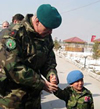Number 1 | April 6, 2007
By Michael Rubin
Published in the Weekly Standard, March 19, 2007. This is an excerpted version of the article, the full version is available on the Middle East Forum website, at http://www.meforum.org/article/1670.
Speaking before the Senate Appropriations Committee on February 27, Secretary of State Condoleezza Rice stepped into a diplomatic minefield when she referred to the Iraqi-Turkish frontier as "the border between Turkey and Kurdistan." Turkish newspapers and television across the political spectrum condemned her remarks Turkish newspapers and television across the political spectrum condemned her remarks. Prime Minister Recep Tayyip Erdogan characterized her statement as "wrong" and said that Turkey, at least, remains committed to Iraq's territorial integrity. The State Department said Rice simply misspoke (…)
(…) The same day, Biden published an op-ed in the Boston Globe saying his plan "offers a roadmap to a political settlement in Iraq that gives its warring factions a way to share power peacefully and us a chance to leave with our interests intact." He is wrong. As French diplomat François Georges-Picot and his British counterpart Mark Sykes discovered after World War I, boundaries drawn in a boardroom have unintended consequences. And even as State Department spokesman Sean McCormack sought to rectify Rice's error, Kurdistan Democratic party leader Massoud Barzani commented, "Turkey, Syria, and Iran should get used to the idea of an independent Kurdistan." Barzani's confidence is understandable. Iraqi Kurdish autonomy already far exceeds his wildest pre-war expectations.
(…) Biden is correct that federalism cannot be avoided. However, he is incorrect to assume that federalism should be based on ethnic and sectarian division rather than on Iraq's existing geographical provinces. Ethnic division will not bring security (…)
(Barzani’s) administration provides safe haven and supplies to Kurdistan Workers Party (PKK) terrorists who have been responsible for approximately 30,000 deaths in Turkey since 1984. The Turkish government accuses the Iraqi Kurdistan Regional Government of furnishing passports to PKK terrorists on Turkey's most wanted list. Turkish officials complain there are six PKK bases operating in territory controlled by Barzani's party. Just as weapons supplied by the Clinton administration to Palestinian security forces ended up in the hands of terrorists, so too have arms supplied by the U.S. government to Kurdish fighters, the peshmerga, found their way into PKK hands (…) Meanwhile, the PKK continues to smuggle explosives and carry out attacks in Turkey. Barzani refuses to stop weapons trafficking across the border with his own peshmerga militia, and refuses the Iraqi army permission to do so.
Iraqi Kurdish leaders continue to shelter the PKK. Whether their support is active or passive is irrelevant, for there are no acceptable levels of support for terror. Nor is it responsible to undercut the security of a long-term NATO ally like Turkey. Until Iraqi Kurdish leaders expel terrorists in their midst and renounce interests beyond Iraq's border, any congressional encouragement of ethnic federalism risks plunging the region into chaos.

























